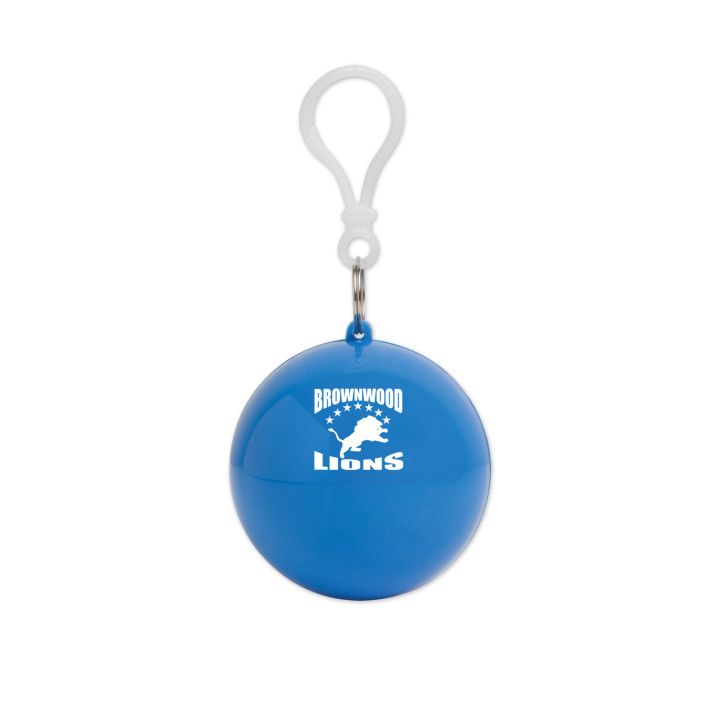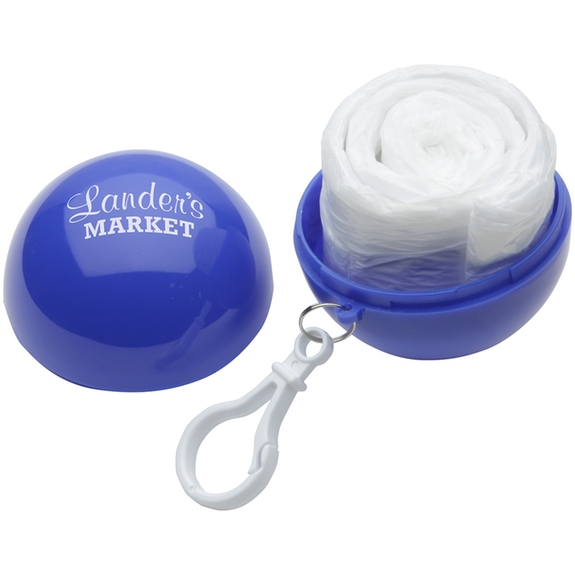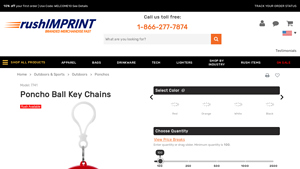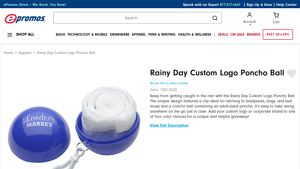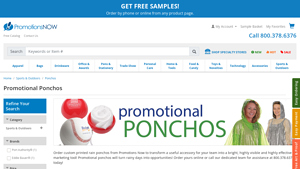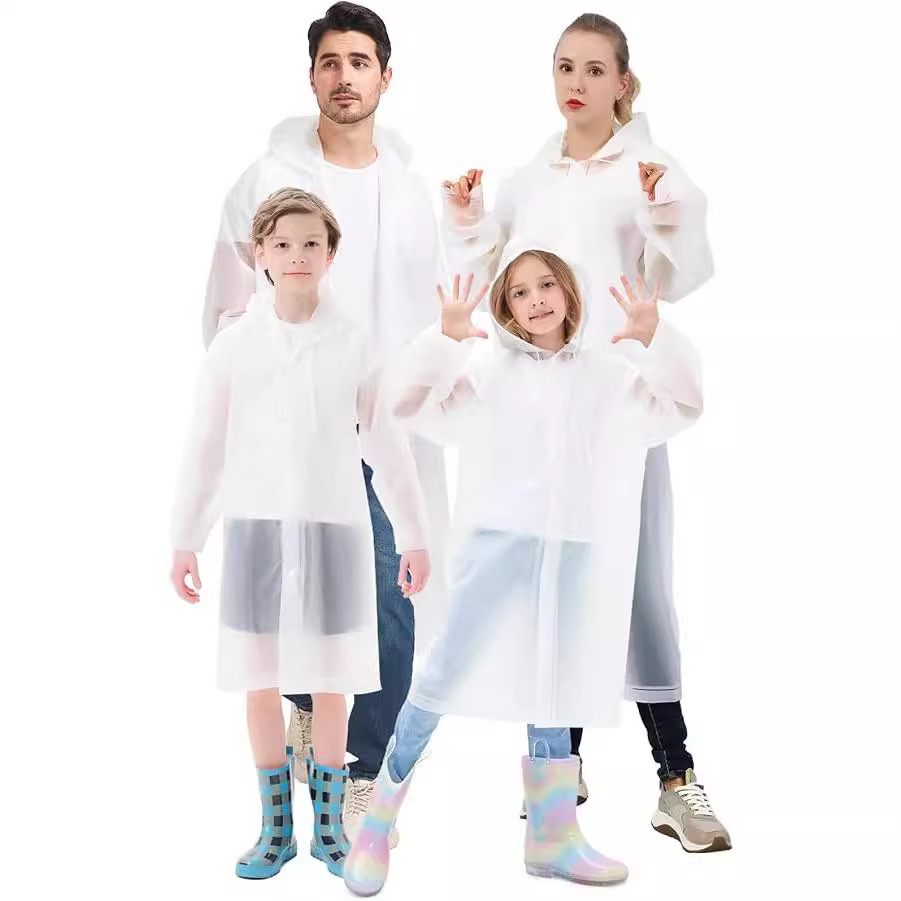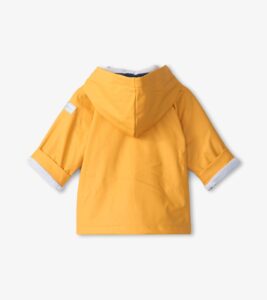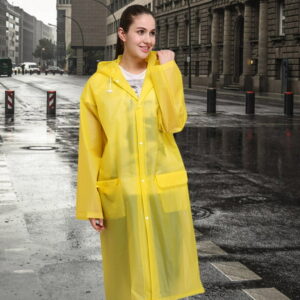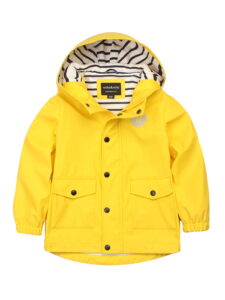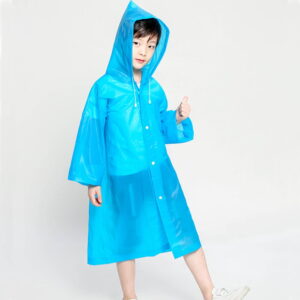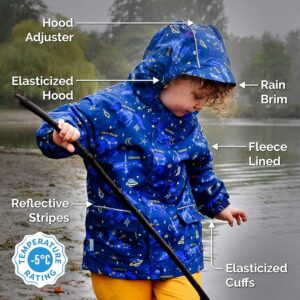Introduction: Navigating the Global Market for Custom Poncho Ball
In an increasingly unpredictable climate, sourcing effective promotional products like custom poncho balls can be a daunting task for international B2B buyers. These innovative items not only offer practical rain protection but also serve as powerful marketing tools that can enhance brand visibility during outdoor events. This guide delves into the diverse world of custom poncho balls, exploring the various types available, their applications across different industries, and key considerations for supplier vetting.
B2B buyers from regions such as Africa, South America, the Middle East, and Europe will find valuable insights on pricing structures, material choices, and customization options, empowering them to make informed purchasing decisions. The guide also highlights how these unique promotional items can be utilized in various settings, from corporate events to sports games, ensuring that your brand stands out, rain or shine.
By understanding the nuances of the global market for custom poncho balls, businesses can strategically leverage these products to maximize their marketing impact and customer engagement. Whether you’re looking to enhance your corporate gifting strategy or seeking a memorable giveaway for an upcoming event, this comprehensive resource will equip you with the knowledge needed to navigate the market effectively.
Navegação de artigos
- Top 3 Custom Poncho Ball Manufacturers & Suppliers List
- Introduction: Navigating the Global Market for Custom Poncho Ball
- Understanding Custom Poncho Ball Types and Variations
- Key Industrial Applications of Custom Poncho Ball
- 3 Common User Pain Points for ‘Custom Poncho Ball’ & Their Solutions
- Strategic Material Selection Guide for Custom Poncho Ball
- In-depth Look: Manufacturing Processes and Quality Assurance for Custom Poncho Ball
- Practical Sourcing Guide: A Step-by-Step Checklist for ‘Custom Poncho Ball’
- Comprehensive Cost and Pricing Analysis for Custom Poncho Ball Sourcing
- Alternatives Analysis: Comparing Custom Poncho Ball With Other Solutions
- Essential Technical Properties and Trade Terminology for Custom Poncho Ball
- Navigating Market Dynamics and Sourcing Trends in the Custom Poncho Ball Sector
- Frequently Asked Questions (FAQs) for B2B Buyers of Custom Poncho Ball
- Isenção de responsabilidade e termos de uso importantes
- Strategic Sourcing Conclusion and Outlook for Custom Poncho Ball
Understanding Custom Poncho Ball Types and Variations
| Nome do tipo | Principais características distintivas | Aplicativos B2B primários | Prós e contras resumidos para compradores |
|---|---|---|---|
| Disposable Poncho Ball | Lightweight, compact, single-use | Outdoor events, festivals, sports gatherings | Prós: Econômico e fácil de distribuir. Contras: Not eco-friendly, limited durability. |
| Keychain Poncho Ball | Packs into a small, portable keychain | Corporate giveaways, team events, promotional gifts | Prós: Convenient for on-the-go use, brand visibility. Contras: Limited coverage area. |
| Heavyweight Poncho Ball | Durable, reusable material, often hooded | Corporate gifts, outdoor job sites, events | Prós: Long-lasting, offers substantial protection. Contras: Higher cost, bulkier to carry. |
| Eco-Friendly Poncho Ball | Made from recycled materials, reusable | Sustainability-focused brands, eco-conscious events | Prós: Supports green initiatives, reusable. Contras: Generally higher price point. |
| Sports-Themed Poncho Ball | Designed to resemble sports balls (e.g., footballs, soccer balls) | Sports events, team promotions, fan giveaways | Prós: Unique branding opportunity, appeals to sports enthusiasts. Contras: May not suit all branding strategies. |
What Are the Key Features of Disposable Poncho Balls?
Disposable poncho balls are lightweight and compact, designed for single use. These ponchos are ideal for large outdoor events, such as festivals and sports gatherings, where unexpected rain can occur. They are cost-effective, making them easy to distribute in bulk. However, their single-use nature raises environmental concerns, and they may not provide the durability needed for prolonged use.
How Do Keychain Poncho Balls Enhance Brand Visibility?
Keychain poncho balls are designed for portability, easily attaching to bags or keyrings. This makes them excellent promotional items for corporate giveaways or team events. Their compact size ensures they are readily available when inclement weather strikes, enhancing brand visibility. However, while they are convenient, their coverage area is limited, which may not provide adequate protection in heavy rain.
Why Choose Heavyweight Poncho Balls for Corporate Gifts?
Heavyweight poncho balls are crafted from durable materials and often feature a hood, making them suitable for outdoor job sites and corporate gifts. Their longevity and substantial rain protection make them a valuable investment for brands looking to make a lasting impression. While they are more expensive and bulkier than disposable options, their quality can lead to enhanced brand loyalty among recipients.
What Benefits Do Eco-Friendly Poncho Balls Offer?
Eco-friendly poncho balls are made from recycled materials and are designed for reuse, appealing to brands that prioritize sustainability. They are perfect for eco-conscious events and can enhance a brand’s image as socially responsible. However, these ponchos typically come with a higher price point, which may be a consideration for budget-conscious buyers.
How Can Sports-Themed Poncho Balls Attract Target Audiences?
Sports-themed poncho balls mimic the design of sports equipment, making them an attractive option for sports events and team promotions. They provide a unique branding opportunity that resonates with sports enthusiasts, enhancing engagement during events. However, their niche appeal may not align with all branding strategies, limiting their effectiveness in broader marketing campaigns.
Key Industrial Applications of Custom Poncho Ball
| Indústria/Setor | Specific Application of Custom Poncho Ball | Valor/benefício para a empresa | Principais considerações de fornecimento para este aplicativo |
|---|---|---|---|
| Esportes e recreação | Giveaway at sporting events | Enhances brand visibility and customer engagement | Ensure durability and water resistance for outdoor use |
| Gerenciamento de eventos | Promotional items for festivals | Increases brand recognition and customer loyalty | Consider bulk purchasing options for cost-effectiveness |
| Viagens e turismo | Travel kits for tourists | Provides practical value while promoting the brand | Look for lightweight and portable designs for convenience |
| Corporate Gifts & Employee Benefits | Employee safety kits | Shows commitment to employee welfare and safety | Customize for branding and ensure quality materials |
| Eco-Friendly Products | Sustainable event giveaways | Aligns with corporate social responsibility goals | Source from suppliers offering eco-friendly materials |
How Are Custom Poncho Balls Used in Sports & Recreation?
In the sports and recreation industry, custom poncho balls serve as practical giveaways during events like marathons, soccer matches, and outdoor festivals. These compact ponchos, stored in a ball format, are easy to carry and distribute, providing immediate protection against unexpected rain. They not only keep attendees dry but also prominently display the brand’s logo, enhancing visibility. For international buyers, sourcing poncho balls that are durable and made from high-quality materials is crucial, especially in regions with unpredictable weather patterns.
What Role Do Custom Poncho Balls Play in Event Management?
Event management companies often utilize custom poncho balls as promotional items at festivals and outdoor gatherings. By providing these ponchos, businesses can ensure attendees remain comfortable and dry, while also reinforcing brand presence. This dual benefit fosters positive associations with the brand, encouraging repeat attendance at future events. Buyers in this sector should consider bulk purchasing to maximize cost-efficiency and ensure timely delivery, especially for large-scale events.
How Can Custom Poncho Balls Enhance Travel & Tourism Experiences?
In the travel and tourism sector, custom poncho balls are an excellent addition to travel kits for tourists visiting areas with unpredictable weather. These lightweight and portable ponchos offer travelers a convenient solution to stay dry without taking up much space in their luggage. For international B2B buyers, selecting ponchos that are easy to pack and carry is essential, as they cater to the needs of tourists who prioritize convenience during their travels.
Why Are Custom Poncho Balls Important for Corporate Gifts & Employee Benefits?
Corporate entities often incorporate custom poncho balls into employee safety kits, especially for staff who work outdoors or in environments prone to inclement weather. Providing these practical gifts demonstrates a company’s commitment to employee welfare and enhances morale. When sourcing for this application, businesses should focus on the quality and customization options available, ensuring that the ponchos reflect the company’s branding effectively.
How Do Custom Poncho Balls Align with Eco-Friendly Initiatives?
With the increasing emphasis on sustainability, companies looking to enhance their eco-friendly product offerings can utilize custom poncho balls as sustainable event giveaways. These ponchos can be made from recycled materials, showcasing the brand’s commitment to environmental responsibility. International buyers should seek suppliers who prioritize eco-friendly materials and production processes, as this aligns with global trends toward sustainability and can improve brand reputation in environmentally-conscious markets.
3 Common User Pain Points for ‘Custom Poncho Ball’ & Their Solutions
Scenario 1: Struggling with Storage and Portability Challenges
O problema: One common issue faced by B2B buyers, particularly those in event management or retail, is the difficulty of storing and transporting promotional items like custom poncho balls. With limited storage space and the need to keep promotional materials organized and easily accessible, bulky or awkwardly shaped items can be a significant hassle. This can lead to inefficiencies during events where quick access to promotional items is crucial, especially in unpredictable weather conditions.
A solução: To overcome these challenges, buyers should opt for compact and lightweight poncho ball designs that can easily fit into bags or be attached to keychains. When sourcing custom poncho balls, look for options that come in a small, portable casing that allows for easy distribution and storage. Additionally, choosing ponchos made from lightweight materials, such as polyethylene, ensures that they are easy to carry without adding significant weight. Implementing a well-organized inventory system, such as using labeled bins or carrying cases, will further streamline access during events, making it easy to grab and go when the weather turns.
Scenario 2: Concerns About Quality and Durability
O problema: Buyers often worry about the quality and durability of promotional items, especially in regions with unpredictable weather patterns. Poor-quality ponchos can tear easily and fail to provide the necessary protection against rain, leading to dissatisfaction among customers and a negative impact on brand reputation. This concern is amplified for businesses aiming to create a lasting impression at outdoor events where reliability is key.
A solução: To ensure high-quality custom poncho balls, buyers should focus on sourcing from reputable suppliers that provide samples before bulk ordering. Evaluate the materials used; for instance, PVC ponchos are generally more durable than their polyethylene counterparts and can withstand harsher conditions. Request information about the manufacturing processes and durability tests performed on the ponchos. Additionally, consider investing in heavier-duty ponchos for events where weather conditions are more severe, ensuring that your brand is associated with reliability and quality.
Scenario 3: Managing Environmental Concerns
O problema: With increasing emphasis on sustainability, B2B buyers are often faced with the challenge of selecting promotional items that align with eco-friendly practices. Many traditional ponchos are made from single-use plastics, which can create environmental waste and tarnish a brand’s image. This is particularly pertinent for businesses looking to appeal to environmentally conscious consumers or those operating in regions where sustainability is a significant market driver.
A solução: Buyers should seek eco-friendly custom poncho balls made from recycled materials or biodegradable options. When engaging with suppliers, inquire about the environmental impact of the materials used and whether they offer sustainable alternatives. Additionally, consider incorporating a messaging strategy that highlights the eco-friendly nature of these ponchos in your marketing materials. This not only demonstrates your commitment to sustainability but also resonates with consumers who prioritize environmental responsibility. By aligning your promotional items with sustainable practices, you can enhance your brand’s reputation while also appealing to a growing market segment that values eco-conscious choices.
Strategic Material Selection Guide for Custom Poncho Ball
When selecting materials for custom poncho balls, several factors come into play, including performance characteristics, cost, and suitability for specific applications. Here, we analyze common materials used in the production of custom poncho balls, highlighting their properties, advantages, and limitations, particularly for international B2B buyers.
What are the Key Properties of Polyethylene (PE) for Custom Poncho Balls?
Polyethylene (PE) is a popular choice for poncho balls due to its lightweight nature and cost-effectiveness. It typically has a temperature rating that allows it to perform well in various weather conditions, making it suitable for outdoor events. PE is resistant to moisture, which is essential for ponchos designed to protect against rain.
Prós: PE is affordable, easy to manufacture, and can be produced in various colors and thicknesses. It is also recyclable, aligning with sustainability trends.
Contras: While PE is durable for single-use applications, it is less robust than other materials, making it less suitable for heavy-duty or repeated use. Additionally, it may not withstand extreme temperatures as effectively as other materials.
Impacto no aplicativo: PE ponchos are ideal for events like concerts and festivals where lightweight and disposable options are preferred. However, they may not meet the durability expectations of customers in more demanding environments.
How Does PVC Vinyl Compare for Custom Poncho Balls?
PVC (Polyvinyl Chloride) vinyl is another common material used for poncho balls. It offers superior durability and can withstand harsher weather conditions compared to PE. PVC ponchos often have a higher temperature and pressure resistance, making them suitable for more extreme environments.
Prós: PVC is highly durable, reusable, and can be produced with various finishes for aesthetic appeal. It also provides excellent protection against wind and rain.
Contras: The manufacturing process for PVC is more complex and costly compared to PE, which may increase the final product price. Additionally, PVC is less environmentally friendly due to its non-biodegradable nature.
Impacto no aplicativo: PVC ponchos are well-suited for outdoor activities like hiking or sporting events where durability is paramount. However, international buyers should be aware of potential regulatory restrictions regarding PVC use in certain markets.
What Role Do Eco-Friendly Materials Play in Custom Poncho Balls?
Eco-friendly materials, such as recycled polyethylene (rPET) or biodegradable plastics, are gaining traction in the poncho market. These materials often meet sustainability goals while providing adequate performance characteristics.
Prós: They appeal to environmentally conscious consumers and can enhance brand image. They are often comparable in cost to traditional materials while offering similar durability.
Contras: The availability of eco-friendly materials can be inconsistent, and they may not perform as well under extreme conditions compared to traditional materials. Additionally, they may require specific certifications to ensure compliance with environmental standards.
Impacto no aplicativo: Eco-friendly ponchos are ideal for brands looking to promote sustainability at events. However, international buyers must ensure compliance with local regulations regarding eco-friendly materials.
What are the Considerations for Non-Woven Fabrics in Custom Poncho Balls?
Non-woven fabrics, often made from polypropylene, are another option for poncho balls. These materials are lightweight and can be manufactured to be water-resistant.
Prós: Non-woven fabrics are cost-effective and can be produced in various colors and designs. They are also easier to print on, allowing for vibrant branding.
Contras: While they are generally durable, non-woven fabrics may not provide the same level of waterproofing as PE or PVC. They are also less suitable for prolonged exposure to moisture.
Impacto no aplicativo: Non-woven ponchos are suitable for promotional events and giveaways where brand visibility is essential. However, they may not meet the expectations of customers requiring high-performance rain gear.
Summary Table of Material Properties for Custom Poncho Balls
| Material | Typical Use Case for Custom Poncho Ball | Principais vantagens | Principal desvantagem/limitação | Custo relativo (baixo/médio/alto) |
|---|---|---|---|---|
| Polyethylene (PE) | Disposable events, festivals | Leve e econômico | Less durable, single-use only | Baixa |
| PVC Vinyl | Atividades externas pesadas | Highly durable and reusable | Higher cost, less eco-friendly | Alta |
| Eco-Friendly | Sustainable events, brand promotion | Appeals to eco-conscious buyers | Inconsistent availability | Médio |
| Non-Woven Fabric | Promotional giveaways | Vibrant branding options | Limited waterproofing | Baixa |
This strategic material selection guide provides a comprehensive overview for international B2B buyers, enabling them to make informed decisions based on their specific needs and market conditions.
In-depth Look: Manufacturing Processes and Quality Assurance for Custom Poncho Ball
What Are the Key Stages in the Manufacturing Process of Custom Poncho Balls?
The manufacturing of custom poncho balls involves several critical stages, ensuring that each product meets the required standards for functionality and branding. Understanding these stages is essential for B2B buyers looking for quality and reliability in their promotional items.
Material Preparation: What Materials Are Used for Custom Poncho Balls?
The first step in the manufacturing process is the preparation of materials. Custom poncho balls are typically made from lightweight, waterproof materials such as polyethylene (PE) or polyvinyl chloride (PVC). These materials are chosen for their durability and ability to withstand varying weather conditions.
- Seleção de materiais: Manufacturers evaluate the physical properties of materials to ensure they meet specifications for flexibility, strength, and waterproof capabilities.
- Sourcing: Responsible sourcing is crucial. Suppliers should ideally provide certifications for the materials, ensuring they are free from harmful substances and comply with international safety standards.
Forming: How Are Poncho Balls Shaped and Assembled?
Once the materials are prepared, the forming stage begins. This involves shaping the poncho material into its final design, which includes the ball casing and the poncho itself.
- Cutting and Shaping: The polyethylene or PVC sheets are cut into specific shapes using precision cutting techniques. This ensures uniformity and minimizes waste.
- Heat Sealing or Welding: The edges of the cut materials are then sealed using heat sealing or ultrasonic welding methods, which create a waterproof bond. This technique is essential to maintain the integrity of the poncho in wet conditions.
Assembly: How Are Custom Poncho Balls Assembled for Final Production?
The assembly stage involves bringing together all components of the poncho ball.
- Ball Assembly: The poncho is folded and stored within a compact ball casing. This requires precise folding techniques to ensure the poncho can be easily deployed when needed.
- Branding Application: Custom branding elements, such as logos or slogans, are printed onto the poncho using various printing methods like screen printing or heat transfer. This is a critical step, as it directly impacts the promotional value of the product.
Finishing: What Final Touches Are Added to Custom Poncho Balls?
The finishing stage ensures that each poncho ball meets quality and aesthetic standards before being packaged and shipped.
- Quality Inspection: Each product undergoes a thorough inspection for defects, including checks for material integrity and branding accuracy.
- Embalagem: Finally, the poncho balls are packaged in a way that protects them during transportation and highlights their branding for retail display.
What Quality Assurance Processes Should B2B Buyers Expect?
Quality assurance (QA) is vital in the manufacturing process of custom poncho balls, especially for B2B buyers who are investing in bulk orders. Understanding the QA processes can help ensure that the products received meet expectations.
What International Standards Should Be Considered?
B2B buyers should be aware of various international standards that manufacturers may adhere to, which can serve as a benchmark for quality.
- ISO 9001: This is a widely recognized standard for quality management systems (QMS). Companies with ISO 9001 certification demonstrate a commitment to maintaining high-quality processes and continuous improvement.
- Marcação CE: For products sold in Europe, CE marking indicates compliance with health, safety, and environmental protection standards. It is particularly relevant for promotional items that may be used in public settings.
Quais são os principais pontos de verificação do controle de qualidade no processo de fabricação?
Quality control checkpoints are integrated throughout the manufacturing process to ensure that any issues are detected early.
- Controle de qualidade de entrada (IQC): This step involves inspecting raw materials upon arrival at the manufacturing facility. Suppliers should provide documentation proving that materials meet specified standards.
- Controle de qualidade durante o processo (IPQC): During production, random samples are taken to ensure compliance with quality standards. This may include checks on dimensions, material properties, and branding accuracy.
- Controle de qualidade final (FQC): Before packaging, final inspections are conducted to ensure that the finished products meet all quality and branding requirements.
Como os compradores B2B podem verificar o controle de qualidade do fornecedor?
For B2B buyers, verifying the quality control processes of suppliers is essential to ensure reliability and quality in bulk orders.
What Are the Best Practices for Conducting Supplier Audits?
- Auditorias de fornecedores: Regular audits of suppliers can help verify that their manufacturing processes comply with international standards. This includes reviewing quality control documentation and observing production practices.
- Solicitação de relatórios de qualidade: Buyers should request detailed quality control reports that outline the results of inspections and testing. These documents should also include any corrective actions taken in response to identified issues.
What Role Do Third-Party Inspections Play?
Engaging third-party inspection services can add an additional layer of assurance.
- Independent Verification: Third-party inspectors can provide unbiased evaluations of the manufacturing processes and final products. This is particularly useful for international buyers who may not be able to visit the manufacturing site.
- Verificação de certificação: Inspectors can also verify that suppliers hold the necessary certifications, such as ISO 9001 or CE marking, ensuring that the products meet international standards.
What Are the Unique Quality Control Considerations for International Buyers?
When sourcing from international suppliers, B2B buyers should consider several nuances related to quality control.
- Diferenças culturais: Different regions may have varying approaches to quality assurance. Buyers should understand these cultural differences and how they impact manufacturing practices.
- Conformidade regulatória: Different countries have different regulations regarding materials and safety standards. Buyers must ensure that the products they source comply with the regulations of their own countries.
By understanding the manufacturing processes and quality assurance practices involved in the production of custom poncho balls, B2B buyers can make informed decisions that align with their quality standards and branding goals.
Practical Sourcing Guide: A Step-by-Step Checklist for ‘Custom Poncho Ball’
Introdução
Navigating the procurement process for custom poncho balls can be a complex endeavor, especially for B2B buyers in diverse markets. This guide serves as a practical checklist to streamline your sourcing efforts, ensuring you secure high-quality products that meet your branding and operational needs. Follow these steps to make informed decisions and foster successful supplier relationships.
Etapa 1: Identify Your Target Audience and Use Cases
Understanding who will use the custom poncho balls and in what context is essential. Are they intended for outdoor events, sports teams, or promotional giveaways? Identifying the target audience helps you select designs and features that resonate with users, ensuring maximum engagement and brand visibility.
- Consider demographics: age, interests, and expected usage scenarios.
- Think about the environmental conditions where the ponchos will be used, such as rain, wind, or extreme temperatures.
Etapa 2: Defina suas especificações técnicas
Before reaching out to suppliers, outline the specifications for your custom poncho balls. This includes size, material, color options, and any specific branding requirements such as logo placement and imprint methods.
- Specify material types: lightweight polyethylene for disposability or durable PVC for longevity.
- Determine if you need eco-friendly options to align with sustainability goals.
Etapa 3: Research Potential Suppliers
Conduct thorough research to identify reputable suppliers who specialize in custom poncho balls. Look for companies with experience in your target markets, as they will better understand local regulations and preferences.
- Review online directories, trade shows, and industry publications for potential leads.
- Check supplier ratings and reviews on platforms like Alibaba or Trustpilot.
Etapa 4: Request Samples for Quality Assurance
Once you’ve narrowed down your list of suppliers, request samples of their poncho balls. This step is crucial to evaluate the quality and durability of the products before making a bulk order.
- Assess the printing quality of your logo on the samples.
- Check the material’s feel and functionality, ensuring it meets your specifications.
Etapa 5: Verificar as certificações e a conformidade do fornecedor
Ensure that the suppliers you are considering comply with international quality standards and regulations relevant to your market. This verification is essential for maintaining product quality and safety.
- Request certifications such as ISO or CE to confirm adherence to quality management standards.
- Inquire about their ethical sourcing practices, particularly if you’re sourcing from regions with specific labor laws.
Etapa 6: Avalie o preço e as condições de pagamento
Discuss pricing structures and payment terms with your shortlisted suppliers. Understanding the total cost, including shipping and any additional fees, is vital for budgeting.
- Compare prices across suppliers, but also consider the quality of products offered.
- Negotiate payment terms that work for your business, such as deposits or installment payments.
Etapa 7: Establish Clear Communication and Timelines
Effective communication is key to a successful procurement process. Establish clear timelines for production, shipping, and delivery to avoid any disruptions.
- Use project management tools to track progress and deadlines.
- Maintain regular contact with your supplier to address any issues that may arise during the sourcing process.
By following this checklist, B2B buyers can streamline the sourcing of custom poncho balls, ensuring a successful procurement experience that aligns with their branding and operational goals.
Comprehensive Cost and Pricing Analysis for Custom Poncho Ball Sourcing
When considering the sourcing of custom poncho balls, understanding the comprehensive cost structure is vital for B2B buyers. The costs associated with manufacturing custom poncho balls can be broken down into several key components: materials, labor, manufacturing overhead, tooling, quality control (QC), logistics, and profit margin.
What Are the Key Cost Components in Custom Poncho Ball Production?
-
Materiais: The primary materials used in custom poncho balls typically include polyethylene (PE) or PVC vinyl. PE is lighter and generally cheaper, while PVC offers more durability and can be a better option for high-quality products. The choice of materials directly affects cost, with eco-friendly options often commanding a higher price.
-
Trabalho: Labor costs can vary significantly based on the region of production. In countries like Vietnam or Brazil, labor is often more affordable, which can lower overall production costs. However, labor quality and expertise in handling specific materials and processes must also be considered.
-
Custos indiretos de fabricação: This includes utilities, facility maintenance, and other indirect costs associated with production. Overhead costs can fluctuate based on the manufacturing location and operational efficiency.
-
Ferramentas: Custom tooling may be necessary for specialized designs or features. This initial investment can impact the overall cost, particularly for smaller production runs.
-
Controle de qualidade (QC): Implementing effective QC measures ensures that the final product meets the desired specifications and quality standards. While this may add to costs, it can prevent expensive returns and reputational damage.
-
Logística: Shipping and handling costs can vary widely, especially for international shipments. Factors such as distance, shipping method, and the Incoterms agreed upon can significantly influence logistics costs.
-
Margem: Suppliers typically add a profit margin on top of the production costs. This margin can vary based on market demand, supplier reputation, and the competitive landscape.
What Factors Influence the Pricing of Custom Poncho Balls?
Several pricing influencers can affect the final cost for international buyers:
-
Volume e quantidade mínima de pedidos (MOQ): Ordering in bulk typically reduces the per-unit cost. Suppliers may have set MOQs that can impact the overall pricing strategy.
-
Especificações e personalização: Customized designs, colors, and features can increase the cost. Buyers should weigh the benefits of customization against the additional expenses.
-
Qualidade e certificações: Higher-quality ponchos or those that meet specific certifications (e.g., eco-friendly, safety standards) may incur higher costs but can enhance brand value.
-
Fatores do fornecedor: The choice of supplier affects pricing. Established suppliers with a proven track record may charge more, but they often provide greater reliability and quality assurance.
-
Incoterms: Understanding Incoterms is crucial for B2B transactions, as they define the responsibilities of buyers and sellers regarding shipping, insurance, and tariffs. This knowledge helps buyers anticipate and manage costs effectively.
How Can Buyers Negotiate Better Pricing for Custom Poncho Balls?
B2B buyers can adopt several strategies to enhance cost-efficiency:
-
Engage in Bulk Purchasing: Negotiating larger orders can lead to significant discounts. Establishing a long-term relationship with suppliers can also lead to better pricing over time.
-
Considere o custo total de propriedade (TCO): Rather than focusing solely on the purchase price, buyers should consider the entire lifecycle cost of the poncho balls, including shipping, storage, and potential waste.
-
Leverage Market Research: Understanding market rates and competitor offerings can provide leverage in negotiations. Buyers should be prepared to share their findings with suppliers to justify requests for lower pricing.
-
Explore Alternative Suppliers: Conducting a thorough supplier search across different regions (e.g., Africa, South America, Europe) can uncover more competitive pricing options.
Conclusão
While sourcing custom poncho balls, international B2B buyers should consider these cost components and pricing influencers to make informed purchasing decisions. By focusing on effective negotiation strategies and understanding the total cost of ownership, buyers can optimize their procurement processes and enhance brand visibility through effective promotional products. Keep in mind that the prices indicated by suppliers are often subject to change based on market conditions and specific buyer requirements.
Alternatives Analysis: Comparing Custom Poncho Ball With Other Solutions
Introduction: Understanding Alternatives in Promotional Rain Gear
When it comes to promotional items, particularly for outdoor events, providing effective rain protection is crucial. The Custom Poncho Ball offers a unique blend of convenience and branding opportunities. However, businesses should evaluate other viable alternatives to ensure they select the best solution for their specific needs. This section explores how the Custom Poncho Ball compares against alternative rain protection products, namely traditional ponchos and umbrellas, to help B2B buyers make informed decisions.
Tabela de comparação
| Aspecto de comparação | Custom Poncho Ball | Poncho tradicional | Umbrella |
|---|---|---|---|
| Desempenho | Lightweight, compact, quick to deploy | Effective coverage, varying materials | Provides shelter from rain, limited coverage in strong wind |
| Custo | Typically low-cost (approx. $2.07) | Varies widely ($1.50 – $20) | Moderate to high cost ($5 – $30) |
| Facilidade de implementação | Simple; requires no setup | Easy; can be worn immediately | Slightly more complex; requires opening and handling |
| Manutenção | Disposable; no maintenance required | Can be reused; requires cleaning | Reusable; needs care to avoid damage |
| Melhor caso de uso | Events with unpredictable weather | Festivals, outdoor gatherings | Daily use, corporate events |
Análise detalhada das alternativas
1. Traditional Poncho
Traditional ponchos are a popular choice for many outdoor events. They are available in various materials, from disposable polyethylene to more durable PVC options. The pros include effective rain protection and a wide variety of styles. However, they can be less portable than the Custom Poncho Ball and may require a larger storage space. Depending on the quality, costs can vary significantly, making it essential for businesses to consider their budget and expected usage.
2. Umbrella
Umbrellas are a classic solution for rain protection and can provide excellent coverage. They are versatile and can be used in various contexts, from personal to corporate settings. The primary advantage of umbrellas is their ability to offer shelter from both rain and sun. However, they can be cumbersome to carry and are less effective in high winds. Additionally, the cost can be higher compared to a Custom Poncho Ball, which may not be ideal for businesses looking for economical promotional items.
Conclusão: Escolhendo a solução certa para suas necessidades
When selecting the right promotional rain protection solution, B2B buyers should consider their specific requirements, including budget, intended use, and the audience they aim to reach. The Custom Poncho Ball stands out for its affordability and convenience, making it ideal for events where quick deployment is necessary. However, for businesses looking for more substantial protection or versatility, traditional ponchos or umbrellas may offer better alternatives. Ultimately, the choice will depend on the unique circumstances of each event and the brand’s goals for visibility and customer engagement.
Essential Technical Properties and Trade Terminology for Custom Poncho Ball
What Are the Essential Technical Properties of Custom Poncho Balls?
When considering custom poncho balls as promotional items, understanding their technical properties is crucial for making informed purchasing decisions. Below are the key specifications that B2B buyers should be aware of:
-
Composição do material
– Polyethylene (PE): Commonly used for disposable ponchos, PE is lightweight and cost-effective. It offers basic water resistance but may not withstand heavy rain. Ideal for events where convenience is key.
– PVC Vinyl: A more durable option, PVC ponchos are reusable and provide superior protection against harsh weather. While they tend to be pricier, their longevity makes them a worthwhile investment for brands looking to enhance their visibility during outdoor events. -
Tamanho e ajuste
– Custom poncho balls typically come in adult and youth sizes. The fit is designed to be loose to accommodate a wide range of body types, making them suitable for various outdoor activities. Ensuring the right size is essential for comfort and functionality during use. -
Imprint Area
– The imprint area is the designated space where your logo or branding is printed. Understanding the dimensions of this area helps in designing effective promotional materials that maximize brand visibility. Larger imprint areas often translate to better brand exposure. -
Peso e capacidade de embalagem
– The weight of the poncho impacts its portability. Lightweight ponchos that can be easily folded or compressed into a compact size are preferable for events like concerts and sports games. This property enhances convenience for users who may need to carry them in bags or pockets. -
Classificação de resistência à água
– This rating indicates the poncho’s ability to withstand rain. Higher ratings signify better water resistance, which is vital for ensuring that customers stay dry during unexpected downpours. B2B buyers should consider the typical weather conditions of their target markets when selecting ponchos. -
Durability and Reusability
– The durability of a poncho is often determined by its material and construction quality. Reusable ponchos, while more expensive upfront, can provide ongoing promotional value by remaining in circulation longer than disposable options.
What Are Common Trade Terminology and Jargon Related to Custom Poncho Balls?
Familiarity with industry terminology can enhance communication with suppliers and ensure clarity in transactions. Here are some essential terms to know:
-
OEM (fabricante original do equipamento)
– Refers to a company that produces parts or equipment that may be marketed by another manufacturer. In the context of custom ponchos, an OEM might produce the poncho balls for a brand that adds its logo. -
MOQ (Quantidade mínima de pedido)
– This term specifies the smallest number of units that a supplier is willing to sell. Understanding the MOQ is critical for budgeting and inventory planning, especially for businesses looking to maximize promotional efforts. -
RFQ (Request for Quotation, solicitação de cotação)
– An RFQ is a document sent to suppliers requesting pricing information for specific products. This process helps buyers compare costs and make informed purchasing decisions based on competitive pricing. -
Incoterms (Termos Comerciais Internacionais)
– These are predefined commercial terms published by the International Chamber of Commerce (ICC) related to international trade. They clarify the responsibilities of buyers and sellers, including shipping costs, insurance, and delivery timelines. -
Prazo de entrega
– This term refers to the time it takes from placing an order to receiving the product. Understanding lead times is crucial for planning promotional events and ensuring that products arrive on time for distribution. -
Custom Branding Options
– This refers to the different methods available for applying a brand logo to the poncho balls, such as screen printing or embroidery. Knowing the options helps buyers select the most effective branding method for their marketing goals.
By grasping these essential technical properties and trade terms, international B2B buyers can make strategic choices that align with their promotional objectives and ensure their brand stands out in competitive markets.
Navigating Market Dynamics and Sourcing Trends in the Custom Poncho Ball Sector
What Are the Key Market Dynamics and Trends Impacting the Custom Poncho Ball Sector?
The global market for custom poncho balls is witnessing significant growth, driven by rising demand for promotional products across various sectors including sports, entertainment, and outdoor activities. The increasing participation in outdoor events and festivals in regions such as Africa, South America, the Middle East, and Europe has amplified the need for functional yet branded merchandise. Notably, the compact and innovative design of poncho balls—offering convenience and utility—makes them particularly appealing as promotional items.
Technological advancements in printing and material sourcing are enabling manufacturers to produce higher-quality, customizable poncho balls at competitive prices. Additionally, digital platforms are enhancing the purchasing experience, allowing international B2B buyers to source these products more efficiently. Emerging trends include the use of eco-friendly materials and the integration of smart technology, such as QR codes, which can provide consumers with immediate access to brand information or promotional offers.
Furthermore, the rise of e-commerce and direct-to-consumer models has transformed traditional sourcing strategies. International buyers are increasingly seeking suppliers who can provide not only competitive pricing but also fast turnaround times and reliable logistics solutions. As global supply chains continue to adapt, understanding local market dynamics and consumer preferences in regions like Vietnam and Brazil will be crucial for successfully navigating the custom poncho ball market.
How Is Sustainability Influencing Sourcing Decisions in the Custom Poncho Ball Sector?
Sustainability has become a critical factor influencing sourcing decisions in the custom poncho ball sector. With growing awareness of environmental issues, B2B buyers are increasingly prioritizing suppliers who demonstrate a commitment to ethical sourcing and sustainable practices. This shift is driven by consumer demand for eco-friendly products, which has prompted manufacturers to explore biodegradable materials and recyclable packaging options.
The importance of ethical supply chains cannot be overstated. Buyers are seeking transparency in sourcing processes, ensuring that materials are sourced responsibly and that labor practices meet international standards. Certifications such as Global Organic Textile Standard (GOTS) or OEKO-TEX® can enhance a brand’s credibility and appeal, positioning products favorably in the market.
Moreover, the use of recycled materials in the production of custom poncho balls not only reduces environmental impact but also aligns with the values of eco-conscious consumers. Brands that embrace sustainability can create a competitive edge, enhancing brand loyalty and customer retention. By integrating sustainable practices into their sourcing strategies, B2B buyers can contribute to a more sustainable future while capitalizing on emerging market opportunities.
How Has the Custom Poncho Ball Market Evolved Over Time?
The custom poncho ball market has evolved significantly from its inception as a simple promotional item to a multifaceted product that serves both functional and branding purposes. Initially, ponchos were primarily used for their practicality in inclement weather; however, the introduction of compact designs, such as poncho balls, has transformed them into trendy, portable giveaways that appeal to a wider audience.
Over the years, advancements in materials and printing technologies have allowed for greater customization, enabling businesses to showcase their logos and messages effectively. The shift towards eco-friendly materials has further enriched the product offerings, responding to the growing consumer demand for sustainable options.
As international markets become more interconnected, the evolution of the custom poncho ball reflects broader trends in consumer behavior and corporate responsibility, marking a significant shift in how promotional products are designed, marketed, and sourced. This ongoing evolution presents B2B buyers with opportunities to leverage innovative products that resonate with their target audiences while promoting their brand values.
Frequently Asked Questions (FAQs) for B2B Buyers of Custom Poncho Ball
-
1. How do I ensure the quality of custom poncho balls from suppliers?
To ensure quality, start by conducting thorough supplier vetting. Request samples of the poncho balls to evaluate materials, construction, and printing quality. Check for certifications or compliance with international quality standards relevant to your region. Additionally, consider reviews or testimonials from other B2B buyers who have sourced similar products. Establish clear quality assurance processes, including detailed specifications in your purchase order to avoid discrepancies. -
2. What are the minimum order quantities (MOQs) for custom poncho balls?
MOQs can vary significantly among suppliers, ranging from as few as 100 units to several thousand. When sourcing custom poncho balls, clarify MOQs upfront to ensure they align with your budget and needs. If you require a smaller quantity, some suppliers offer options for lower MOQs, but these may come with higher per-unit costs. It’s advisable to negotiate terms to find a balance between quantity and pricing that works for your business. -
3. What customization options are available for custom poncho balls?
Customization options typically include color, size, and printing techniques for your logo or branding. Some suppliers may offer additional features such as personalized packaging or unique shapes. Be clear about your branding requirements and ask for examples of previous custom work to gauge the supplier’s capabilities. Understanding the limitations and possibilities of customization will help you create a product that resonates with your target audience. -
4. What payment terms should I expect when sourcing custom poncho balls?
Payment terms can vary, but common practices include a deposit upfront (usually 30-50%) with the balance due upon delivery or before shipping. Some suppliers may offer net payment terms, allowing payment within a specified period after delivery. Always clarify payment methods accepted (e.g., bank transfer, credit card) and consider using a secure escrow service for larger orders to protect your investment. -
5. How can I manage logistics for shipping custom poncho balls internationally?
Effective logistics management involves selecting reliable shipping partners who understand international trade regulations. Discuss shipping options with your supplier to choose between air and sea freight based on urgency and cost. Ensure that you have a clear understanding of customs duties, taxes, and documentation required for your destination country. Tracking shipments and maintaining open communication with your supplier and logistics provider can help mitigate delays. -
6. What factors should I consider when selecting a supplier for custom poncho balls?
When selecting a supplier, consider their experience in the industry, production capacity, and reputation. Look for suppliers who specialize in promotional products and have a proven track record with international clients. Request references or case studies to evaluate their reliability. Additionally, assess their communication responsiveness and willingness to accommodate your specific needs, as this can significantly impact your overall experience. -
7. Are there eco-friendly options available for custom poncho balls?
Yes, many suppliers offer eco-friendly poncho balls made from sustainable materials, such as recycled plastics or biodegradable options. Inquiring about the environmental impact of your promotional products can enhance your brand’s image and appeal to environmentally conscious consumers. Ensure that the supplier can provide certifications or documentation supporting the eco-friendliness of their products. -
8. How can I effectively market custom poncho balls to my audience?
Marketing strategies for custom poncho balls should focus on highlighting their practicality during outdoor events, sports, or festivals. Use social media and email campaigns to showcase your poncho balls in action, emphasizing their unique features and benefits. Consider partnering with event organizers for sponsorship opportunities, where you can distribute your branded poncho balls directly to attendees. Engaging storytelling around your brand’s commitment to quality and utility can also resonate well with potential customers.
Isenção de responsabilidade e termos de uso importantes
⚠️ Isenção de responsabilidade importante
As informações fornecidas neste guia, inclusive o conteúdo referente a fabricantes, especificações técnicas e análise de mercado, são apenas para fins informativos e educacionais. Elas não constituem aconselhamento profissional sobre compras, aconselhamento financeiro ou aconselhamento jurídico.
Embora tenhamos feito todos os esforços para garantir a precisão e a atualidade das informações, não nos responsabilizamos por erros, omissões ou informações desatualizadas. As condições de mercado, os detalhes da empresa e os padrões técnicos estão sujeitos a alterações.
Os compradores B2B devem realizar sua própria due diligence independente e completa antes de tomar qualquer decisão de compra. Isso inclui entrar em contato diretamente com os fornecedores, verificar as certificações, solicitar amostras e buscar consultoria profissional. O risco de confiar em qualquer informação contida neste guia é de responsabilidade exclusiva do leitor.
Top 3 Custom Poncho Ball Manufacturers & Suppliers List
1. Rush Imprint – Poncho Ball Key Chains
Domínio: rushimprint.com
Registrado: 2002 (23 anos)
Introdução: Model: 7741 Poncho Ball Key Chains\nProduct Description: PE Poncho in Convenient Carrying Ball. One Size Fits All. Great for Outdoor Events.\nPrice includes one color, one location imprint.\nSize: 2.5″h x 2.5″w x 5″d\nImprint Area: 0.75″h x 1″w\nAvailable Colors: Red, Orange, White, Black, Blue\nQuantity Price Breaks: 100 – $1.68, 250 – $1.58, 500 – $1.47, 1000 – $1.42, 2500 – $1.37\nMinimum quant…
2. ePromos – Custom Logo Poncho Ball
Domínio: epromos.com
Registrado: 1998 (27 anos)
Introdução: Rainy Day Custom Logo Poncho Ball
Item: 10013520
Características:
– Unique design with a clip for attaching to backpacks, bags, and belt loops
– Contains an adult-sized poncho
– Easy to carry
– Custom logo or corporate branding available
– Available in four color choices
Material: PVC
Size: 2.5″ diameter (ball)
Packaging: Individually Polybagged
Weight: 28.0 lbs. / 200 pcs.
Imprint Detail:
– Price includ…
3. Promotions Now – Custom Printed Rain Ponchos
Domínio: promotionsnow.com
Registrado: 1998 (27 anos)
Introdução: Essa empresa, Promotions Now - Custom Printed Rain Ponchos, é uma entidade notável no mercado. Para obter detalhes específicos do produto, é recomendável visitar diretamente o site da empresa.
Strategic Sourcing Conclusion and Outlook for Custom Poncho Ball
In summary, the strategic sourcing of custom poncho balls offers businesses a unique opportunity to enhance brand visibility while providing a practical solution for outdoor events. These compact, multifunctional promotional items serve not only as effective marketing tools but also as essential gear for customers in diverse weather conditions. The variety of options—from disposable ponchos to eco-friendly reusable designs—ensures that businesses can cater to different market needs and preferences, making them suitable for various events, from concerts to corporate gatherings.
As international B2B buyers, especially from regions like Africa, South America, the Middle East, and Europe, it is crucial to recognize the value of investing in high-quality, branded ponchos. They not only keep your audience dry but also create lasting impressions that resonate with your brand ethos.
Looking ahead, the demand for custom poncho balls is expected to grow as outdoor activities continue to thrive. Now is the time to explore partnerships with reliable suppliers who can meet your sourcing needs and help elevate your brand’s presence. Embrace this opportunity to stand out in the marketplace by incorporating custom ponchos into your promotional strategy today.

